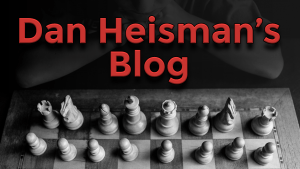The Ricky S Story: A Chess Parable
When I was in high school, our school had no chess team, so I would frequently travel after school to our arch-rival high school and hang out with their strong team.
One of the players on the arch-rival's team was Ricky S. Ricky was a year or so younger than I and was a very special student; he was extremely smart and, moreover, one of his hobbies was schoolwork!
It was rumored that his class was once given an assignment to write a 25-page term paper. Ricky was so enthusiastic he turned in a 125-page term paper, but was devastated when the teacher only gave him a "B", explaining "Ricky, it was an excellent paper, but I assigned a 25 page paper and you did not follow directions. I did not appreciate having to read a 125-page paper!"
All the kids used to tease Ricky for being so smart and, for the most part, he took it very well. However, there was one problem: the school had a 5-man chess team and Ricky had trouble making it as 5th board!
This is not surprising when you consider that the other players on the team were not exactly dummies, and all had greater interests in chess:
1st board: a member of MENSA, now a lawyer in DC. USCF 1800
2nd board: became a psychiatrist. USCF 1650
3rd board: played 100+ slow games against me (Dan) when he missed a year of school due to rheumatic fever, and played in USCF tournaments,
etc.
But for Ricky chess was more of a hobby. Therefore, for all his brilliance, he wasn't (yet) as good as his teammates.
One day Ricky quit the chess team. I can't remember if I asked him why or just heard from one of his teammates, but Ricky's reply was "I just got tired of the other kids asking 'Ricky, if you're so smart, how come you're not so good at chess?'"
What those questioners didn't understand is that, like most other very complex tasks, becoming good at chess is not just innate, but takes quite a bit of time and practiced study (see Developing Young Chess Masters: What are the Best Moves? and The Improvement Feedback Loop [and links therein]). For Ricky, that study was not as much fun, so his lack of development was not surprising. For more on this, see Chess, Learning, and Fun.
I've always written that chess is a combination of intelligence and knowledge, with your intelligence helping you develop your innate skills. As anyone who has given the matter any thought should expect, players who are intelligent but have never develped their "chess skills" are usually still fairly weak players. For example, a leading string theorist physicist Ed Witten is USCF 1700, a respectable rating, but not stellar. And players with very little skill but are highly read (or practiced) in chess are usually not as strong as highly skilled players who are also highly practiced.
Moreover, just pure "IQ intelligence" is not the only aspect of your intelligence used in chess. You can score less than genius in an IQ test and still have good chess traits. Many tests of chess players and IQ have resulted in a variety of conclusions. See both Traits of a Good Chessplayer and Every Good Chessplayer for more on these subjects.
So, whenever I hear someone mention that a "smart" person should be good at chess, I always remember the cautionary tale of Ricky S.



